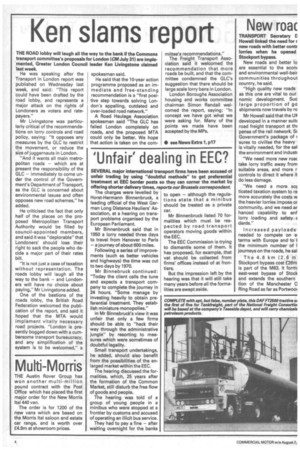'Unfair' dealing in EEC?
Page 4

If you've noticed an error in this article please click here to report it so we can fix it.
SEVERAL major international transport firms have been accused of unfair trading by using "doubtful methods" to get preferential treatment at EEC border posts so they can corner the market by offering shorter delivery times, reports our Brussels correspondent.
Mr Binnenbruck said that in 1950 a lorry needed three days to travel from Hanover to Paris — a journey of about 600 miles.
Following a series of improvements (such as better vehicles and highways) the time was cut to two days by 1970.
Mr Binnebruck continued: "Today the client calls the tune and expects a transport company to complete the journey in 24 hours. "Some manage by investing heavily to obtain preferential treatment. They establish miniature monopolies."
In Mr Binnebruck's view it was unfair that only a few firms should be able to "hack their way through the administrative jungle" by resorting to measures which were sometimes of doubtful legality.
Small transport undertakings, he added, should also benefit from the possibilities of the enlarged market within the EEC.
The hearing discussed the formalities, which, 25 years after the formation of the Common Market, still disturb the free flow of goods and people.
The hearing was told of a group of young people in a minibus who were stopped at a frontier by customs and accused of operating an illicit bus service.
They had to pay a fine — after waiting overnight for the banks tions state that a minibus should be treated as a private car.
Mr Binnenbruck listed 70 formalities which must be respected by road transport operators moving goods within the EEC.
The EEC Commission is trying to dismantle some of them. It has proposed, for example, that vat should be collected from firms' offices instead of at frontiers.
But the impression left by the hearing was that it will still take many years before all the formalities are swept aside.






















































